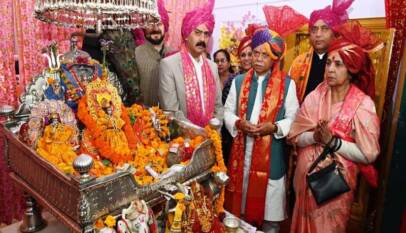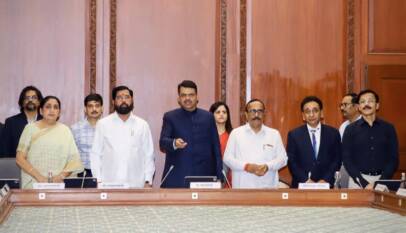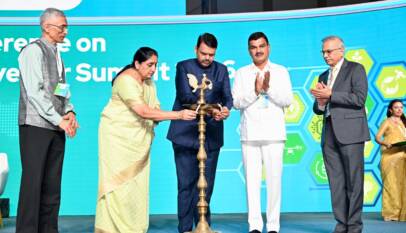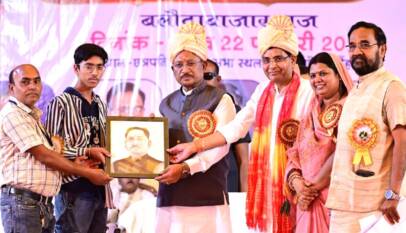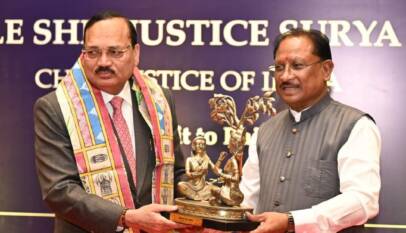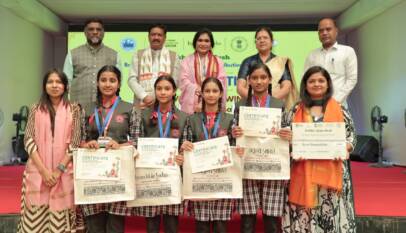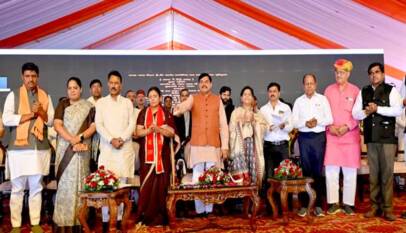Incident Occasion – Babasaheb Dr. Bhimrao Ambedkar Jayanti; National Interest First for Strengthening Democracy, Not Personality Worship
The rise of the architect of the Indian Constitution, world gem Babasaheb Dr. Bhimrao Ambedkar, must be called the rise of a revolutionary sun who awakened awareness about human rights among the neglected, dim, and socially faceless sections of society.
The great leader Babasaheb Dr. Ambedkar carried out the historic task of giving a new social identity to the Dalits, downtrodden, and backward people who lived for hundreds of years in slavery due to caste-based inequality under the Manusmriti-based social system, and made them vocal. Through that, he uprooted the caste system and untouchability from the so-called society and established social equality in the country. On the occasion of the birth anniversary of such a man of the era, world gem Babasaheb Dr. Bhimrao Ambedkar, heartfelt tribute from Indians of all religions!
The place of Babasaheb, who brought about a social revolution, remains unshakable in modern Indian history like the Sahyadri mountains. The great man who gave the message of social equality to the whole of humanity, Babasaheb Dr. Ambedkar’s birth anniversary, April 14, was declared as “Equality Day” in Canada last year. For this, we Indians express our gratitude to the Canadian government. World gem Babasaheb Dr. Bhimrao Ambedkar was admired not just by India but by the entire world. In the past, Oxford University prepared a list of the 100 greatest scholars in the world, and Babasaheb’s name was at the forefront—a matter of great pride for Indians.
Babasaheb Dr. Bhimrao Ambedkar, not just the protector of Dalits, downtrodden, and backward communities, but of all humanity, was born on April 14, 1891, in Mhow, Madhya Pradesh, in the family of Subedar Ramji Maloji Rao Ambedkar—and it was as if a new university of knowledge was born. Revered Bhimabai was Babasaheb’s mother. She passed away when Babasaheb was just five years old, and hence he lost his mother’s care early in life. His father, Subedar Ramji, was in the army. Not only him, but Babasaheb’s grandfather Maloji Rao was also in the army. Truly, they dedicated their entire lives to national security. Later, their son Bhimrao, known as Babasaheb Dr. Ambedkar, became the architect of the Constitution and the maker of independent India’s destiny. In fact, the Ambedkar family originally hailed from Ambavade, near Dapoli in Ratnagiri district. After his father’s death, Babasaheb’s elder brother Anandrao took responsibility for his education. Notably, Maharaja Sayajirao Gaikwad of Baroda and Rajarshi Chhatrapati Shahu Maharaj of Kolhapur both encouraged and provided significant help to Babasaheb for higher studies abroad. Our deep respect and salute to them!
Revered Babasaheb Dr. Ambedkar’s wife, Mata Ramai Bhimrao Ambedkar, stood firmly with him till the end of her life. She was truly his shadow. After leading a life of struggle and self-respect, she passed away. During Babasaheb’s illness and hospitalization, he met Dr. Savita Kabir, who was taking care of him, and this acquaintance turned into marriage in 1948. Thus, Babasaheb Dr. Ambedkar’s life was a journey of mixed experiences. He lived with self-respect and taught his followers to live with self-respect too. That’s why he is called a great man.
To bring educational, social, and economic development among the poor, neglected, Dalit-downtrodden, and backward castes and tribes, Babasaheb understood that first, we must become highly educated. He made a firm decision to study various disciplines deeply. In this way, through scholarship, hard work, determination, and persistence, he achieved great heights in the field of education. At world-class universities like Cambridge and Oxford, he pursued M.A. degrees in various social sciences (Economics, Political Science, Sociology). Then he earned a Ph.D. with his thesis The Problem of the Rupee. Later he obtained D.Litt. (Osmania University), D.Sc., M.Sc., LL.D (Columbia University), and a Barrister degree—all achieved through intense effort and intelligence. He also briefly worked as a professor at Sydenham College. A renowned economist, a great politician and sociologist, a versatile editor-journalist, writer, literary figure, constitutional expert, and astronomer—Babasaheb’s multifaceted identity is recognized in India and around the world. Because, along with the Indian Constitution, he also helped many newly independent nations frame their constitutions. That’s why Babasaheb’s work is recognized globally.
With the aim of spreading education everywhere, Babasaheb started Milind College in Aurangabad and through the People’s Education Society in Mumbai, he established Siddharth College, Law College, and Dr. Babasaheb Ambedkar Arts and Commerce College. Also, he established more than 20 educational institutions in places like Mahad, Dapoli, Pandharpur, Nanded, etc. Babasaheb announced educational facilities and scholarships for the poor, needy, economically weaker, and backward communities, thus opening the doors of education for them. Importantly, he wove a network of educational institutions for the overall upliftment of the backward classes. Furthermore, he gave the guiding message—Educate, Organize, and Agitate—to the Dalit, downtrodden, and backward communities. To bring them into the mainstream of the nation, he made provisions in the Constitution for reservations and promotions in central and state government jobs, so that the backward society, lagging for hundreds of years, could join the national mainstream. Truly, Babasaheb was not just the support of the backward classes but of all humanity.
Educational visionary Babasaheb Dr. Bhimrao Ambedkar dedicated his entire life to eliminating illiteracy among backward communities through education. Against this background, he gave them the valuable advice—Learn to survive. So that the children of the poor and backward sections could have easy access to study materials and books on various subjects, Babasaheb built a library of about 50,000 books on various topics at his Rajgruha residence in Dadar. In fact, Babasaheb spent his entire life for the upliftment of the neglected sections of society. He was truly the destiny-maker of all the backward classes.
South Africa Outclass India by 76 Runs in Crucial Super 8 Clash
Gujarat, Feb 2026 : India suffered a heavy 76-run defeat against South Africa in a high-vo…


